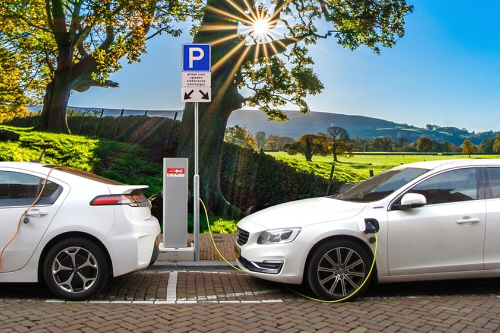The Electric Car Future Is Finally Taking off
今年有望成为电动汽车业起飞转折点
There have been many false dawns for the electric car. France and the UK were among the pioneers of electric vehicles in the late 19th century, with well-heeled customers using them for short trips around cities. By the early 1900s, however, the discovery of abundant oil reserves and larger road networks had helped to undermine the case for electric in favour of petrol.
电动汽车行业曾出现过许多次虚假的黎明。19世纪末,法国和英国曾是电动汽车领域的其中两个先驱国家。当时在这两个国家,富有的车主会驾驶电动汽车在城市周边短途旅行。然而,到了20世纪初,丰富石油储量的探明和更大规模公路网的建设,削弱了使用电动汽车的理由,人们纷纷转向拥抱燃油车。
Today, more than a century later, polluting diesel and petrol cars still dominate sales globally but there are encouraging signs that 2021 could prove the start of a lasting electric future. Norway, a nation whose wealth is based on fossil fuels, last year became the first country in the world where the sale of electric cars overtook those powered by petrol, diesel and hybrid engines. Electric vehicles made up just over 54 per cent of all new cars sold in the country in 2020, a global record, and up from a mere 1 per cent of the overall market a decade ago. It still has some way to go but Norway looks on course to meet a government target, set in 2016, of banning sales of all internal combustion engine vehicles by 2025.
一个多世纪后的今天,污染严重的柴油车和汽油车仍在全球车辆销量中占据主导,但有令人鼓舞的迹象表明,2021年可能成为一个持久的电动未来的开端。财富建立在化石燃料基础上的挪威,去年成为全球首个电动汽车销量超过汽柴油及混合动力汽车的国家。2020年,电动汽车在挪威销售的所有新车中所占比例略高于54%,创下全球纪录,而10年前这一比例还仅为1%。虽然还有一段路要走,但挪威似乎有望实现2016年挪威政府设定的目标,即到2025年禁止所有内燃机汽车的销售。
As policymakers look to rebuild their economies after the coronavirus pandemic, Norway’s success in promoting the uptake of EVs provides an important lesson in how targeted policies can help to change consumer behaviour and spur private-sector investment. Early and generous government support as far back as 1990 in the form of a temporary exemption from the country’s vehicle purchase tax proved an important first step.
随着各国政策制定者寻求在新型冠状病毒肺炎(Covid-19,即2019冠状病毒病)疫情后重建本国经济,挪威在推广电动汽车方面的成功,可以提供重要经验,指导其他国家如何用有针对性的政策帮助改变消费者行为以及刺激私营部门投资。早在1990年,挪威政府就以暂免车辆购置税的形式给予电动汽车行业大力支持,此举后来被证明是重要的第一步。

Since then other initiatives, including lower road taxes and the removal of charges for toll roads and public ferries, have helped to spur the uptake of EVs. Crucially, while an extensive charging infrastructure was begun with government money, it kickstarted subsequent private sector investment.
自那以来,包括降低公路税、免收过路费和公共轮渡费在内的其他举措,帮助刺激了人们对电动汽车的接纳。至关重要的是,虽然大规模充电基础设施是在政府资金的支持下开建的,但它带动了随后的私营部门投资。
Norway’s fossil fuel heritage may have helped to cushion the loss of tax revenues but the country’s success offers a road map for others in how to promote a green industrial revolution. Britain’s Boris Johnson last year vowed to end the sale of new petrol and diesel cars and vans by 2030 as part of a 10-point green plan. The target is laudable but only achievable if accompanied by an improvement of the existing charging infrastructure for EVs. Britain’s motor industry body last September pointed out that for customer demand to keep pace with the growth in the number of zero emission capable car models available, at least 2.8m new public charging points would need to be built by 2035 – an investment worth £16.7bn.
挪威化石燃料带来的财富可能帮助缓冲了税收的损失,但该国的成功为其他国家推动绿色工业革命提供了一条路线图。英国首相鲍里斯·约翰逊(Boris Johnson)去年承诺,到2030年停止销售新的汽柴油轿车和货车,作为一项“绿色十点计划”的一部分。这一目标值得称赞,但只有在改善现有电动汽车充电基础设施的情况下才能实现。英国汽车行业组织去年9月指出,想让客户需求跟上市场提供的零排放车型数量的增长,到2035年至少需要建造280万个公共充电桩,这需要167亿英镑的投资。
Ultimately, the goal must be for EVs to become commercial in their own right. A key tipping point will come when they cost as much to produce as conventional vehicles. Mass production and competition will help, and the interest of Apple, the maker of the iPhone, in entering the industry possibly through a tie-up with Hyundai, is an indication that both are on their way. Norway has begun to eliminate some of the previous fringe benefits of owning an electric car such as free parking, charging and no tolls. The next critical question will be when to phase back in taxes for EVs. A key challenge for the industry will be how to produce cheaper and more efficient batteries.
最终,我们的目标必须是让电动汽车企业凭自身实力实现商业化。当电动汽车的生产成本与传统汽车相当时,关键的转折点就会到来。大规模生产和竞争将有所帮助,而iPhone制造商苹果(Apple)有意通过与现代汽车(Hyundai)合作进军电动汽车业,表明生产和竞争两方面都有所推进。挪威已经开始取消先前给予电动汽车车主的一些附加福利,如免费停车、免费充电和免过路费。下一个关键问题将是何时逐步恢复针对电动汽车的课税。电动汽车行业面临的一个关键挑战将是如何以更低的成本生产更高效的电池。
For now, the optimism contained in forecasts that global EV sales will grow 50 per cent or more this year appears well-founded. At the same time, the remarkable stock market run of Tesla, which has made Elon Musk the world’s richest man, shows that investors are betting electric cars are here to stay, irrespective of which company ultimately inherits the electric future.
目前看来,“全球电动汽车销量今年将增长50%或更多”,这种预测中的乐观情绪似乎是有充分根据的。与此同时,特斯拉(Tesla)在股市的出色表现——已让埃隆·马斯克(Elon Musk)成为了全球首富——表明,无论哪家公司最终主导电动未来,投资者都正在押注电动汽车将继续存在。
英文、中文版本下载:http://www.yingyushijie.com/shop/source/detail/id/2585.html








